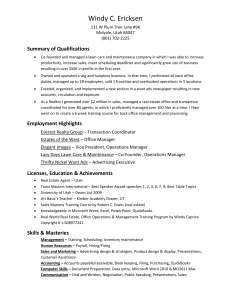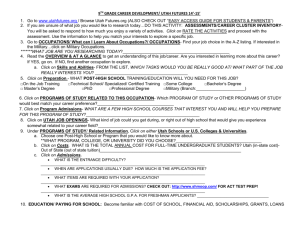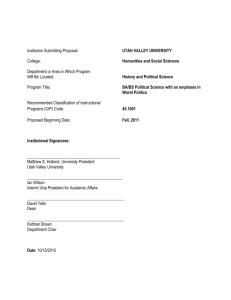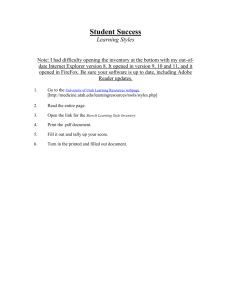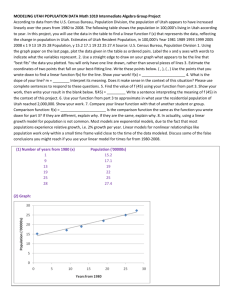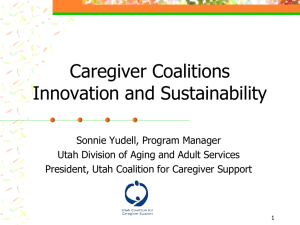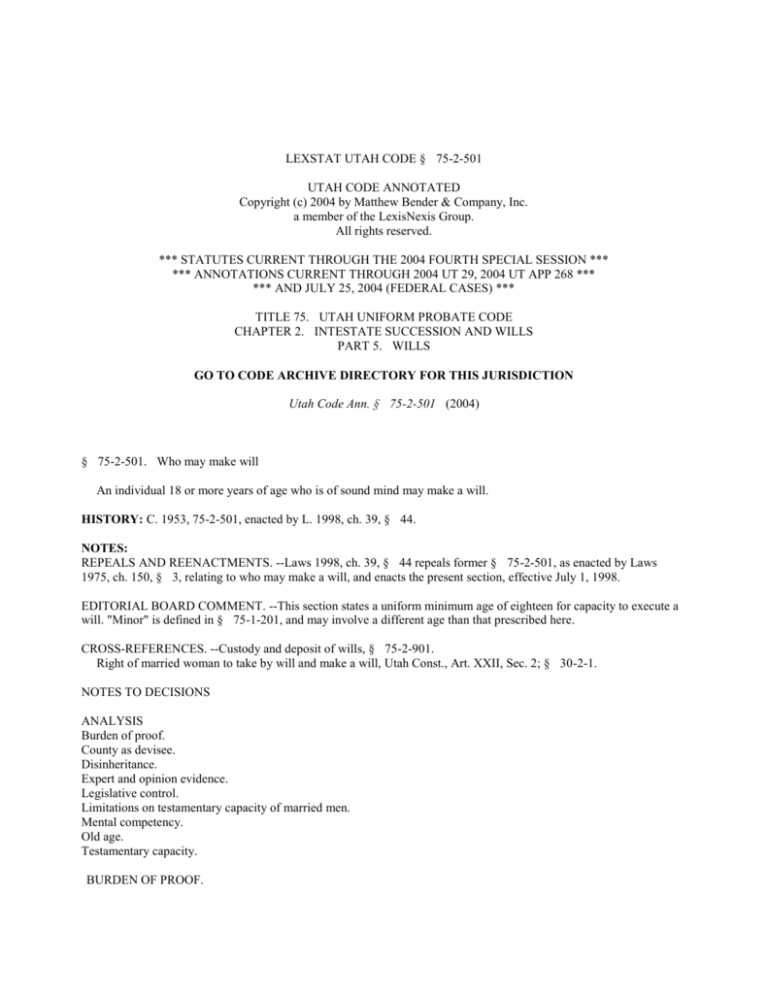
LEXSTAT UTAH CODE § 75-2-501
UTAH CODE ANNOTATED
Copyright (c) 2004 by Matthew Bender & Company, Inc.
a member of the LexisNexis Group.
All rights reserved.
*** STATUTES CURRENT THROUGH THE 2004 FOURTH SPECIAL SESSION ***
*** ANNOTATIONS CURRENT THROUGH 2004 UT 29, 2004 UT APP 268 ***
*** AND JULY 25, 2004 (FEDERAL CASES) ***
TITLE 75. UTAH UNIFORM PROBATE CODE
CHAPTER 2. INTESTATE SUCCESSION AND WILLS
PART 5. WILLS
GO TO CODE ARCHIVE DIRECTORY FOR THIS JURISDICTION
Utah Code Ann. § 75-2-501 (2004)
§ 75-2-501. Who may make will
An individual 18 or more years of age who is of sound mind may make a will.
HISTORY: C. 1953, 75-2-501, enacted by L. 1998, ch. 39, § 44.
NOTES:
REPEALS AND REENACTMENTS. --Laws 1998, ch. 39, § 44 repeals former § 75-2-501, as enacted by Laws
1975, ch. 150, § 3, relating to who may make a will, and enacts the present section, effective July 1, 1998.
EDITORIAL BOARD COMMENT. --This section states a uniform minimum age of eighteen for capacity to execute a
will. "Minor" is defined in § 75-1-201, and may involve a different age than that prescribed here.
CROSS-REFERENCES. --Custody and deposit of wills, § 75-2-901.
Right of married woman to take by will and make a will, Utah Const., Art. XXII, Sec. 2; § 30-2-1.
NOTES TO DECISIONS
ANALYSIS
Burden of proof.
County as devisee.
Disinheritance.
Expert and opinion evidence.
Legislative control.
Limitations on testamentary capacity of married men.
Mental competency.
Old age.
Testamentary capacity.
BURDEN OF PROOF.
Page 2
Utah Code Ann. § 75-2-501
Burden of proof was on contestant to show mental incapacity and undue influence; the proponent of will could meet
that by proof of a negative, that is, that he did not procure the execution of the will by undue influence, and testator was
not mentally incapable. In re Bryan's Estate, 82 Utah 390, 25 P.2d 602 (1933).
COUNTY AS DEVISEE.
Testamentary disposition to county hospital could be taken by the county as a corporation. Manatakis' Estate v.
Walker Bank & Trust Co., 5 Utah 2d 412, 303 P.2d 701 (1956).
DISINHERITANCE.
Testator was acting wholly within his rights in bequeathing the bulk of his property and cutting off children with
bequests of $1 each. In re Ford's Estate, 70 Utah 456, 261 P. 15 (1927).
Testator, if of sound and disposing mind and memory, had right to dispose of property as he saw fit and could
disinherit his sister if he so desired. In re Bryan's Estate, 82 Utah 390, 25 P.2d 602 (1933).
A decree setting aside a fraudulent conveyance by husband to wife could properly operate only to rescind the transfer
of whatever title the husband conveyed to his wife; it could not divest wife of her elective one-third interest. Cardon v.
Harper, 106 Utah 560, 151 P.2d 99, 154 A.L.R. 906 (1944).
EXPERT AND OPINION EVIDENCE.
Opinions of lay witnesses concerning testamentary capacity and undue influence, while admissible, were to be based
upon facts relevant to the issue, and upon occurrences reasonably contemporaneous, and not too remote in point of time,
for issue was whether testator had capacity when will was made. In re Hansen's Will, 50 Utah 207, 167 P. 256 (1917).
Opinions of lay witnesses upon questions of insanity and undue influence were not permitted unless such witnesses
possessed personal knowledge respecting the facts upon which their opinions were based. In re Hansen's Will, 50 Utah
207, 167 P. 256 (1917).
In will contest opinions of lay witnesses as to mental condition could not be given unless witness had personal
acquaintanceship with testator and detailed underlying facts upon which his opinion was based. In re Hanson's Estate,
87 Utah 580, 52 P.2d 1103 (1935).
Trial court, in will contest, had duty to weigh and give effect to opinions of witnesses as to whether testatrix was
mentally competent to make will at time will was made. In re McCoy's Estate, 91 Utah 212, 63 P.2d 620 (1937).
LEGISLATIVE CONTROL.
Privilege to dispose of one's property by will was not a natural right but depended upon positive law and was within
legislative control. In re Little, 22 Utah 204, 61 P. 899 (1900); In re Mower's Estate, 93 Utah 390, 73 P.2d 967 (1937).
The right to make a will could not be invaded or abrogated by the courts; only the Legislature could do that.
Anderson v. Anderson, 43 Utah 26, 134 P. 553 (1913).
Right to dispose of property by will was governed and controlled entirely by statute; such statutes were mandatory,
and unless strictly complied with, will was void. In re Wolcott's Estate, 54 Utah 165, 180 P. 169, 4 A.L.R. 727 (1919);
In re Love's Estate, 75 Utah 342, 285 P. 299 (1930).
LIMITATIONS ON TESTAMENTARY CAPACITY OF MARRIED MEN.
Under former statutes, husband had absolute power to dispose of his real and personal property by will, except that
he could not legally devise away from his wife more than two-thirds of his legal and equitable estate in real property. In
re Little, 22 Utah 204, 61 P. 899 (1900).
MENTAL COMPETENCY.
Personal habits, general behavior, eccentricities, age, physical infirmities, attitude of testator towards children, and
fact that he failed substantially to recognize them by way of bequests under will were proper subjects for investigation
in testing mental capacity of testator. In re Hansen's Will, 52 Utah 554, 177 P. 982 (1918).
In will contest wherein proponent was deceased's second wife and contestants were an adopted child and son by
deceased with his first wife from whom he had been divorced, evidence of sexual relations of a perverted nature with
proponent before and after marriage was insufficient on issues of undue influence and lack of testamentary capacity to
sustain verdict of jury that will was not that of deceased. In re Ford's Estate, 70 Utah 456, 261 P. 15 (1927).
In will contest, testimony as to inherent brain weakness was admissible although observed years before making of
will, but testimony as to infirmities coming from old age were limited to those observed in fair proximity to date of
execution of will. In re Hanson's Estate, 87 Utah 580, 52 P.2d 1103 (1935).
Page 3
Utah Code Ann. § 75-2-501
Objections to admission of will to probate, including allegation that at time will was made mind of testatrix was
benumbed by narcotics and sedatives and she could only follow suggestions of others, were sufficient to raise issue of
mental competency of testatrix. In re McCoy's Estate, 91 Utah 212, 63 P.2d 620 (1937).
OLD AGE.
No general rule could be laid down as to whether the infirmities of old age incapacitated the testator. In re Swan's
Estate, 51 Utah 410, 170 P. 452 (1918).
TESTAMENTARY CAPACITY.
Any person not only had legal right to make will but he had the right to make as many different ones as he chose, and
to make them in accordance with dictates of his own conscience and judgment. In re Young's Estate, 33 Utah 382, 94 P.
731, 17 L.R.A. (n.s.) 108, 126 Am. St. R. 843, 14 Ann. Cas. 596 (1908).
Eccentricities and idiosyncrasies, however gross, do not constitute insanity, and cannot incapacitate one otherwise
sound from making a valid will; protestant had to do more than show that testator was untidy in his personal habits and
dress at home, and that he had a miserly disposition and an entire lack of affection for his offspring, to establish that
testator was of unsound mind. In re Hansen's Will, 50 Utah 207, 167 P. 256 (1917).
In will contest on ground of lack of testamentary capacity, the test was whether testator had testamentary capacity at
time the alleged will was made, and the inquiry was to be limited to a period of time not too remote from that event. In
re Hansen's Will, 50 Utah 207, 167 P. 256 (1917).
That testator of foreign birth, inured to hardship and scant means of living, did not measure up to ideals of American
life, was not to mitigate against his right to dispose of his property by will. In re Hansen's Will, 52 Utah 554, 177 P. 982
(1918).
Mere eccentricities or inability to conduct a business, whether for lack of training or for subnormal mental capacity,
did not prove incapacity to make a will. In re Swan's Estate, 4 Utah 2d 277, 293 P.2d 682 (1956).
Objector failed to sustain his burden of proving incompetency where he showed only that elderly testatrix was
physically weak, pessimistic, distrustful, forgetful, and tending toward paranoia; and where it also appeared that eight
months after the alleged undue influence the testatrix prepared and executed a holographic will of substantially the same
content as the previous will made at the time of the alleged undue influence. In re Holteb's Estate, 17 Utah 2d 29, 404
P.2d 27 (1965).
Court does not have power to set aside testamentary disposition of protected person who has not been declared
incompetent, notwithstanding stipulation of parties to conservatorship dispute. In re Estate of Anderson, 671 P.2d 165
(Utah 1983).
A Veteran's Administration incompetency rating, and resulting conservatorships and guardianship, did not create a
presumption of decedent's incapacity to make a will; however, such indicia of diminished mental capacity did, at least,
neutralize the presumption of testamentary capacity and left the proponent of the will with the burden to show, by a
simple preponderance of the evidence, that decedent had the requisite mental capacity to make a valid will. Montes
Family v. Carter, 878 P.2d 1168 (Utah Ct. App. 1994).
COLLATERAL REFERENCES
BRIGHAM YOUNG LAW REVIEW. --Articles II and III of the Uniform Probate Code as Enacted in Utah, 1976
B.Y.U. L. Rev. 425.
AM. JUR. 2D. --79 Am. Jur. 2d Wills § 54.
C.J.S. --94 C.J.S. Wills § 3.
A.L.R. --Incompetent taking under or against will, factors, time and who may make election, 3 A.L.R.3d 6.
Intoxicating liquor or drugs, testamentary capacity as affected by use of, 9 A.L.R.3d 15.
Necessity of laying foundation for opinion of attesting witness as to mental condition of testator or testatrix, 17
A.L.R.3d 503.
Testator's illiteracy or lack of knowledge of language in which will is written as affecting its validity, 37 A.L.R.3d
889.
May parts of will be upheld notwithstanding failure of other parts for lack of testamentary mental capacity or undue
influence, 64 A.L.R.3d 261.
Page 4
Utah Code Ann. § 75-2-501
Alzheimer's disease as affecting testamentary capacity, 47 A.L.R.5th 523.
NOTES APPLICABLE TO ENTIRE TITLE
REPEALS AND REENACTMENTS. --Former Title 75, Probate Code (§ § 75-1-1 to 75-3-16, 75-3-18 to 75-4-4, and
75-4-6 to 75-15-10), was repealed by Laws 1975, ch. 150, § 1, effective July 1, 1977. Present Title 75, the Utah
Uniform Probate Code, was enacted by Laws 1975, ch. 150, § § 2 to 9. Former § § 75-3-17 and 75-4-5 were
previously repealed by Laws 1973, ch. 194, § 1. For detailed information as to the history of the sections of former
Title 75, their contents, and present provisions on the same subjects, see Appendix B at the end of this volume.NOTES
APPLICABLE TO ENTIRE PART
EDITORIAL BOARD COMMENT.Part 5 of Chapter 2 deals with capacity and formalities for execution and revocation
of wills. If the will is to be restored to its role as the major instrument for disposition of wealth at death, its execution
must be kept simple. The basic intent of these sections is to validate the will whenever possible. To this end, the age for
making wills is lowered to eighteen, formalities for a written and attested will are kept to a minimum, holographic wills
written and signed by the testator are authorized, choice of law as to validity of execution is broadened, and revocation
by operation of law is limited to divorce or annulment. However, the statute also provides for a more formal method of
execution with acknowledgement before a public officer (the self-proved will).These family protection provisions
supply the basis for the important small estate provisions of Chapter 3, Part 12.States adopting the Code may see fit to
alter the dollar amounts suggested in these sections, or vary the terms and conditions in other ways so as to
accommodate existing traditions. Although creditors of estates would be aided somewhat if all family exemption
provisions relating to probate estates were the same throughout the country, there is relatively less need for uniformity
of law regarding these provisions than is true of any of the other parts of this article. Still, it is quite important for all
states to limit their homestead, allowance and exempt property provisions, if any, so that they apply only to estates of
decedents who were domiciliaries of the state.Notice that § 75-2-104 imposes a requirement of survival of the
decedent for 120 hours on any spouse or child claiming under this part.
TREATISES. --Thomas and Backman, Utah Real Property Law (LexisNexis 1999), § 3.04(a).

